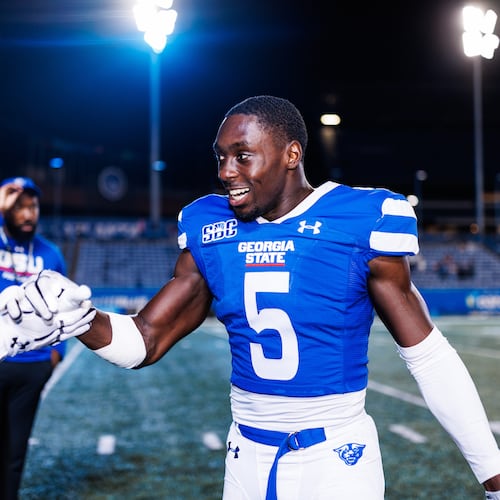It was last August, his first running the Georgia Tech offense, when coordinator Dave Patenaude offered the observation that “we look like a fast-paced, spread team that can move the ball and throw it pretty efficiently.”
The Yellow Jackets may well have looked like such a unit going into the season. They did not maintain that appearance over the season’s 12 games, however. Tech finished 127th in FBS in total offense and 121st in passing efficiency. (Season-ending injuries to three starters undoubtedly made an impact, and it’s possible that practicing against a defense that finished 89th in total defense may not have been the most accurate gauge.)
Nevertheless, Patenaude’s outlook on Tech’s offense for the season is again bullish, and perhaps this time it might have more credence. One significant reason is that the offensive line, which last season often struggled in pass protection and was decent in the run game, figures to be demonstrably improved.
“We are so far advanced from where we were this time last year up front,” Patenaude said.
It appears that Tech will go with a front five of, from left tackle to right tackle, Zach Quinney, Jack DeFoor, Mikey Minihan, Ryan Johnson and Jordan Williams.
Quinney, DeFoor and Johnson figured to be starters; Minihan won the competition at center over Kenny Cooper and William Lay, and Williams evidently won at right tackle in a competition with Charlie Clark.
Johnson, a graduate transfer from Tennessee, has brought the experience of 19 starts with the Volunteers and earned a leadership role.
“Ryan Johnson has come in here and just been a huge cultural piece to us – who he is in the locker room, who he is as a leader, who he is as a teammate – his toughness, his demeanor, how he approaches the game,” coach Geoff Collins said.
His addition could be transformative.
“Ryan has been unbelievable at right guard,” Patenaude said. “He’s really solidified that spot.”
Williams looks as if he could be an answer at offensive tackle for the length of his Jackets career. From Gainesville High, Williams was the first offensive lineman to commit to Tech and offensive-line coach Brent Key in the 2020 class, a player who at 6-foot-6 and 330 pounds is Key’s biggest player. An early enrollee, he impressed coaches and teammates in the abbreviated spring practice. He has kept it up in the preseason.
Patenaude described Williams as “a dude that’s going to play a lot of plays on Sundays in his career. He is definitely an NFL tackle down the line if things continue to go as it is.”
His size alone makes him an effective contributor in pass protection.
“Even if he’s not quite sure, or this technique’s not quite where it should be, he’s just a long way around,” Patenaude said. “Brent just tells him, ‘Look, man, put yourself between the (quarterback) and the D-end and shuffle your feet.’ And when he does that, it’s a long way around.”
Quinney is starting for the third consecutive season and figures to be better in both pass and run blocking with more weight. Quinney started last season at 293 pounds but now is listed at 315. DeFoor may have been the unit’s most effective player last season, earning honorable-mention All-ACC honors. Minihan, who started six games last year in an injury-interrupted season, has done well with organizing the line, making calls and taking pressure off of the quarterbacks.
“Mikey’s done really good,” Patenaude said.
Lay started the last eight games of the season in place of Cooper, who is healthy after his season-ending hip injury. Cooper can be an experienced backup at center and guard.
“He’s got those guys playing at a high level,” Patenaude said of Key. “Our first five or six guys are really good.”
To that end, health will be critical, although Key could turn to players such as Clark or Austin Smith. Freshmen Wing Green, Cade Kootsouradis, Michael Rankins, Ryan Spiers and Paula Vaipulu may be best left to use the season to develop and build strength.
Among returnees, the benefits of a year with Key have taken root.
Said Cooper, “Last year, we were a little bit smaller than what we are now. As a whole, I think we’ve grasped the concepts of our scheme, so when we go out there, we’re feeling a lot more comfortable.”
The size gains are making a difference. Patenaude said that in preseason practices, the Jackets have been successful with a power running game, which he calls a hallmark of his offenses.
Until the season opener at Florida State on Sept. 12, it is mere talk. But, for Tech and its fans, there is reason to be hopeful in the line, if for no other reason than gains in experience and size, as well as the addition of potential difference-makers in Johnson and Williams.
An improved offensive line will make every other facet of the offense better, one that already has proven playmakers in running back Jordan Mason and wide receiver Ahmarean Brown and has plenty of talent behind them.
“When you can bang the ball between the tackles and make extra people get involved in the run game, it makes your pass game and your play-action game so much better, and that’s where we’re headed right now,” Patenaude said.
About the Author
Keep Reading
The Latest
Featured

